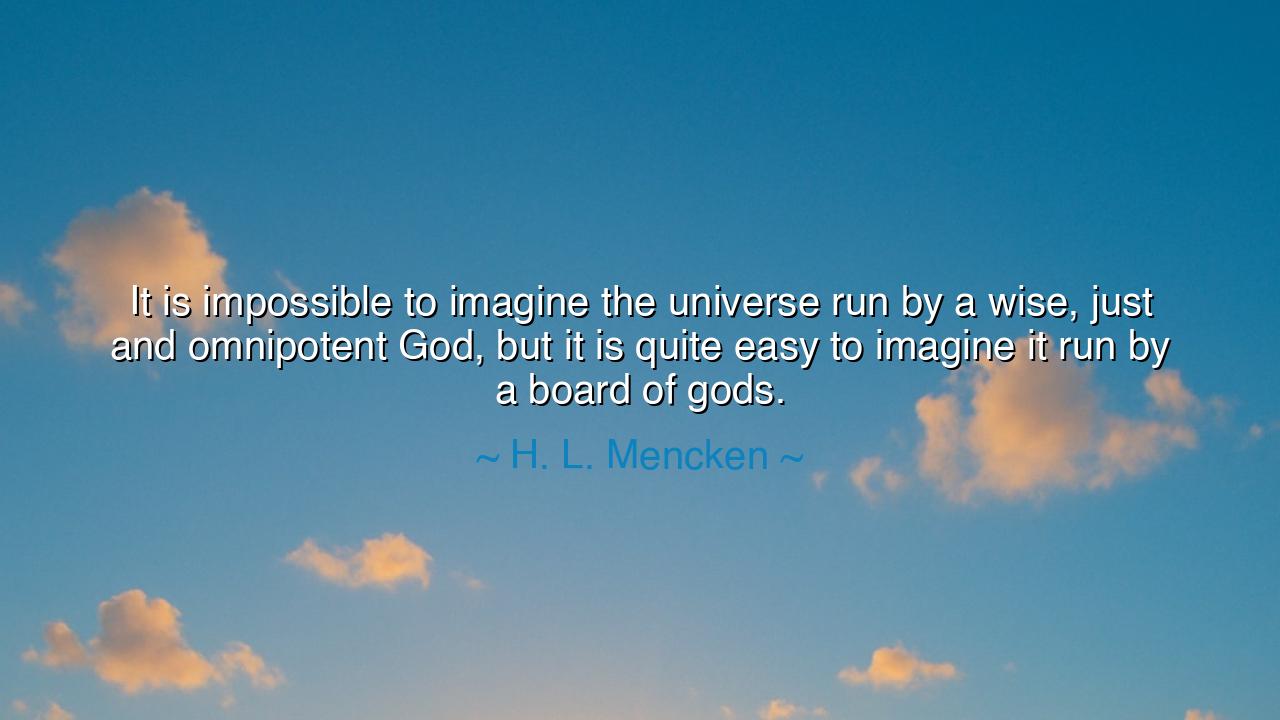
It is impossible to imagine the universe run by a wise, just and
It is impossible to imagine the universe run by a wise, just and omnipotent God, but it is quite easy to imagine it run by a board of gods.






“It is impossible to imagine the universe run by a wise, just, and omnipotent God, but it is quite easy to imagine it run by a board of gods.” Thus spoke H. L. Mencken, the sharp-tongued philosopher of irony and truth, whose words cut through the illusions of human reason with both laughter and lament. Beneath the humor of this saying lies a deep and enduring observation about the nature of the world, the limits of divine perfection, and the chaos of human order. Mencken, ever the skeptic and social critic, saw in the universe not the smooth symmetry of divine justice, but the tangled confusion of conflicting forces — as if creation were not ruled by one omniscient mind, but by a committee of fallible deities, each pulling in a different direction.
The origin of this thought arises from Mencken’s lifelong distrust of absolute systems — whether in religion, government, or philosophy. He was a man of the early 20th century, a witness to two world wars, to hypocrisy in power, and to the endless folly of human self-importance. His humor, though biting, was born of wisdom: he understood that to call the universe “just” is to close one’s eyes to its contradictions. Children suffer; tyrants thrive; nature, indifferent and relentless, devours her own creations. How could such a world, he asks, be governed by a single wise and omnipotent being? Yet, if one imagines a board of gods — a pantheon of quarrelsome powers, each with limited wisdom and conflicting aims — then suddenly the world makes sense. The storm follows the calm, virtue is punished, and beauty coexists with cruelty — all in a grand, bewildering harmony of disorder.
In this way, Mencken’s saying carries the wit of the ancients. The Greeks, too, imagined the heavens filled with gods who bickered, loved, deceived, and fought — beings not perfect, but profoundly human in their passions. Zeus struck with thunder not out of justice, but temper; Aphrodite meddled out of vanity; Ares waged war for glory. And yet, from their divine chaos, the Greeks found wisdom. They saw that life was not ruled by perfection, but by balance, by struggle among powers both noble and foolish. Mencken, though modern in tongue, spoke with this ancient spirit: better a world of capricious gods than one ruled by sterile perfection, for chaos, at least, is alive.
Consider, too, the world of human governance, where Mencken’s satire finds its earthly reflection. A single monarch, claiming divine wisdom, may imagine himself omnipotent and infallible — yet his reign ends in tyranny and blindness. But a council, though divided and clumsy, may stumble its way toward truth, for in its discord lies humility. The board of gods, like a parliament of imperfect souls, represents reality itself — flawed, inconsistent, yet strangely enduring. Think of the great democracies of history, where conflicting voices and clashing visions create a living, breathing order out of argument. To Mencken, this mirrored the divine far better than the myth of perfect control.
There is, too, a deeper meaning behind his laughter — a recognition of the mystery of existence. Mencken does not mock the sacred to destroy it, but to awaken us from the sleep of certainty. By saying it is “impossible to imagine” a perfectly just ruler of the cosmos, he calls us to humility. We cannot fathom divine perfection because we ourselves are not perfect; our reason falters before the vastness of creation. Yet when we look at the world as if governed by many imperfect forces — whether gods, fates, or natural laws — we begin to understand the beauty of imperfection, the harmony that emerges from chaos.
In this, Mencken’s jest becomes a kind of modern myth, one that replaces the throne of heaven with a table of equals. The universe, he suggests, is not a rigid hierarchy but a conversation — between creation and destruction, love and death, wisdom and folly. Its meaning cannot be dictated by one voice, but must be discovered in the interplay of many. This vision is humbler, yet more truthful; it frees us from despair when life seems unjust, for it teaches that even disorder may be divine in its own strange way.
So, my listener, take this lesson to heart: do not demand perfection of the world, nor of yourself. The universe is not ruled by simplicity, but by complexity; not by a single flawless will, but by the meeting of countless imperfect ones — stars, storms, creatures, and souls, each following its nature. In your own life, you too are both ruler and rebel, saint and fool, god and mortal. Embrace that divine chaos. Seek wisdom, yes, but do not be afraid of contradiction. For in the end, as Mencken wittily reminds us, the cosmos may be far less the kingdom of one god — and far more the lively council of many.






AAdministratorAdministrator
Welcome, honored guests. Please leave a comment, we will respond soon